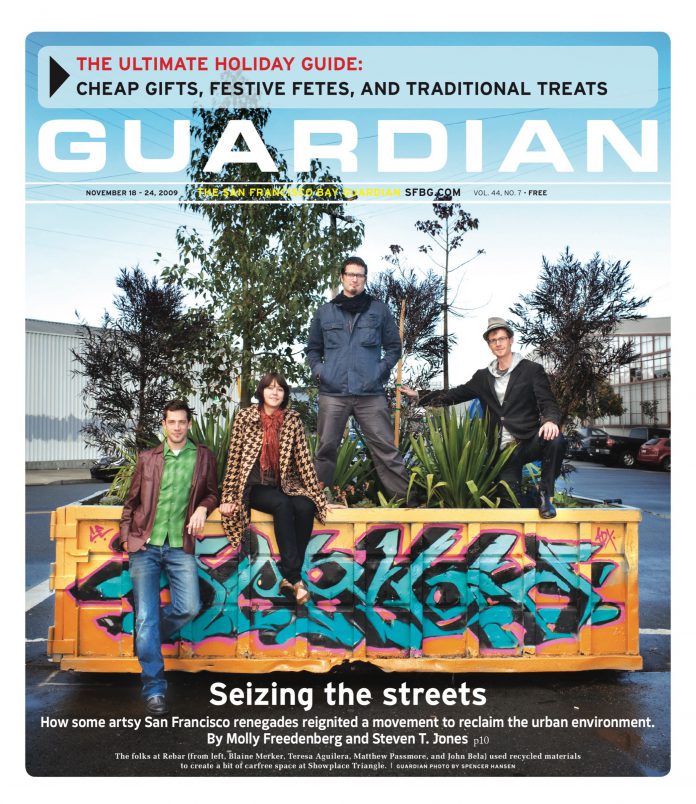arts@sfbg.com
FILM Like so many recent it’s-true-if-we-say-so slogans, "A Republican is a Democrat who’s been mugged" is smugly, fundamentally misguided on more levels than can be addressed here, suggesting that only conservatives have the horse sense to grasp that it’s a big, scary world out there. Interpreted another way, however, this catchphrase contains a grain of truth: the sense of victimization can be blindsiding. When you begin to perceive all criticism as persecutorial, you might forget it’s possible to be wrong.
That’s the worry driving Yoav Shamir’s Defamation, which opens Friday following a stormy reception at July’s San Francisco Jewish Film Festival. The documentarian (2003’s Checkpoint) says that as an Israeli Jew he’s never actually experienced anti-Semitism. So he sets out to explore that prejudice’s status quo — or so he claims, somewhat disingenuously. Because Defamation‘s real agenda is positing anti-Semitism as a distorted, exploited, propagandic bludgeon used to taint any critique of Israeli government policies or the foreign lobbies supporting them.
This is a theory bound to inflame angry emotions, not least the "self-hating Jew" accusation. It must be said that Shamir lays himself at risk — à la Michael Moore — of selectively gathering only evidence that supports his agenda. Anti-Semitism certainly does exist today, in many different forms, around the world. But the only folks Shamir finds to spout negative stereotypes are some African American Crown Heights youths — whose complaints about their insular neighbors seem reasonable enough until they cite Nazi best seller The Protocols of the Elders of Zion as an important ethnic expose — and his own granny. (Bizarrely, she opines that Jews are indeed money-hoarding shirkers of "real" work — albeit only foreign Jews, not industrious Israelis like herself.)
Yet if Defamation‘s deliberate omissions and occasional snarky tone hamper its case, Shamir nonetheless makes legitimately troubling points. He views Israeli media as obsessing over any incidents of global anti-Semitism (and ignoring decreases) much as the U.S. media endlessly dwells on certain lurid crime stories — because their public loves to feel indignant.
More than 30,000 Israeli high schoolers now go on field trips each year to European Holocaust sites. But their experience is heavily stage-managed, with Secret Service guards ensuring they have no contact with locals — in Poland a group is kept sequestered in their hotel because (they’re told) this "relatively hostile country" is rife with neo-Nazis.
No wonder when two girls briefly try to bridge the language barrier with some old men in a park, they instantly assume they’re being insulted. (They are not, as the exchange’s subtitled translation reveals.) This thrilling experience of actual, or at least assumed, anti-Semitism reinforces what one student calls "what makes us special: that no one can stand us, but that we are proud of it."
"Everyone knows the Jews are hated. We are raised that way," another proclaims.
Getting ample cooperation (now regretted) from its Manhattan H.Q.’s staff, Shamir suggests the Anti-Defamation League also inflates anti-Semitism’s modern-day realities to exert political muscle, and to dismiss any criticism of Israel as simple Jew-hating "in disguise." When a British academic at an ADL conference rather mildly asserts anti-Semitism and anti-Zionism can indeed be separated — is it racist to think the West Bank settlements and occupation of Palestinian lands unjust? — he’s denounced as an outrageous provocateur.
The most controversial interviewee is Norman Finklestein, whose book The Holocaust Industry got him pilloried as a Holocaust denier (untrue) and quite likely cost him his teaching position. The son of Shoah survivors, he thinks "the Nazi Holocaust is now the main ideological weapon for launching wars of aggression" and that "pathological narcissism" desensitizes many American Jews to other people’s sufferings. (One U.S. rabbi here theorizes that the sense of ongoing historical persecution has replaced religious observance as many Jews’ primarily source of ethnic-cultural identification.)
Finklestein can be persuasively reasonable. To Defamation‘s credit, however, it doesn’t yell "Cut!" when he whips himself into a crank-case frenzy that masochistically self-destructs his credibility. Absolute righteousness ain’t pretty, anywhere on the political spectrum.
DEFAMATION opens Fri/20 at the Roxie.

